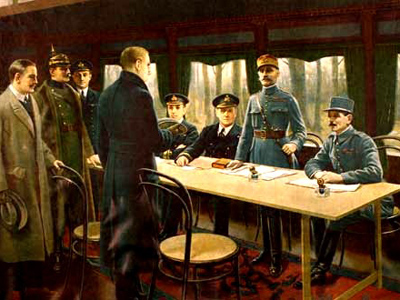
World War One: 1914-18 - The Armistice Of November 1918
This World History quiz is called 'World War One: 1914-18 - The Armistice Of November 1918' and it has been written by teachers to help you if you are studying the subject at senior high school. Playing educational quizzes is one of the most efficienct ways to learn if you are in the 11th or 12th grade - aged 16 to 18.
It costs only $12.50 per month to play this quiz and over 3,500 others that help you with your school work. You can subscribe on the page at Join Us
At 1100 hours on the 11th of November 1918, World War One - the Great War - came to an end, as the German delegates signed the Armistice with the representatives of the Western Allies. Since then the 11th of November has been remembered as Armistice Day.
Ready for more?
not all...
quizzers. Try to win a coveted spot on our Hall of Fame Page.







